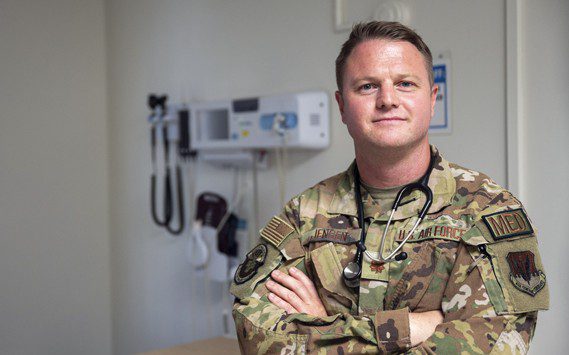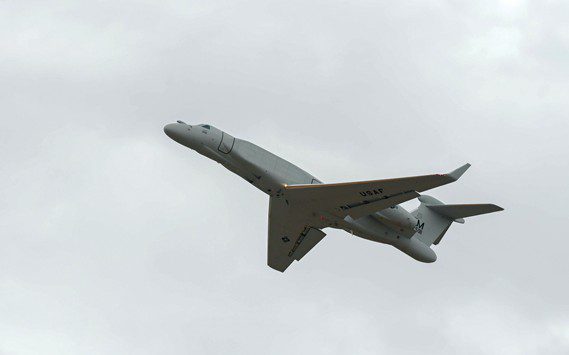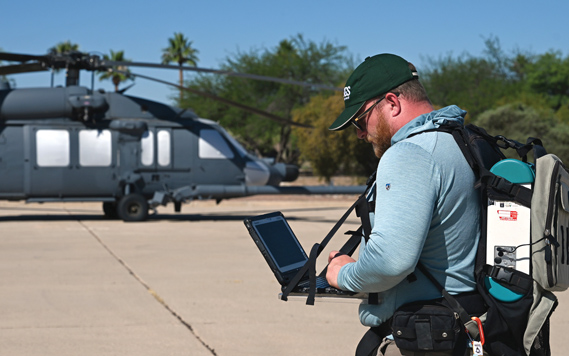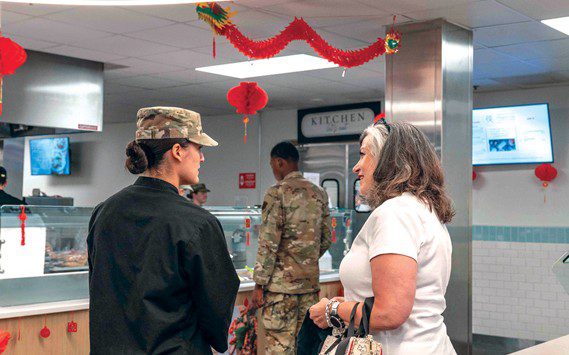DAVIS-MONTHAN AIR FORCE BASE, Ariz. — A remembrance ceremony was held in honor of prisoners of war and those missing in action, Sept. 18.
Every year D-M alternates turns with the Southern Arizona Veterans Affairs Health Care System to host the ceremony. This year D-M hosted the event at the Pima Air and Space Museum.
The ceremony consisted of display tables with prisoners of war memorabilia, a missing man table ceremony, a guest speaker and concluded with a missing man formation flyover.
Local Tucson veterans who were captured during World War II, the Korean War, and the Vietnam War provided memorabilia from their experiences as POWs for the ceremonies attendees to observe.
“Invitations were sent out to the local VFW (Veterans of Foreign Wars) and VA hospital advertising the event, and I was provided with a listing of known POWs that had attended previous POW/MIA events,” said Master Sgt. Dierdre Mister, 355th Force Support Squadron first sergeant and event coordinator. “In addition, one of my committee members had connections with some of the local VFWs and the VA and knew a few local POWs in the area so she reached out to them via the phone and visits.”
The event began with a missing man table ceremony. This symbolizes those who were not able to be there for the event, such as those MIA and those who were killed in action. The table consisted of a white table cloth, a red rose, a red ribbon, a slice of lemon, a pinch of salt, a lighted candle, an inverted glass and an empty chair.
A white cloth symbolizes the purity of their motives when answering the call to serve. A single red rose reminds us of the lives of these Americans and their loved ones. A yellow ribbon symbolizes our continued determination to account for them. A slice of lemon serves as a reminder of their bitter fate. A pinch of salt symbolizes the tears of the missing and their families. A lighted candle reflects the hope for their return. The glass is inverted to symbolize their inability to share a toast. The chair is empty, they are missing.
Following the missing man table ceremony, retired U.S. Air Force Col. Thomas Kirk spoke about his experiences as a POW during the Vietnam War.
During a fighter-bomber raid on Vietnam Kirk’s F-105 Thunderchief was hit by antiaircraft fire. Kirk was forced to eject out of his seat and knocked unconscious.
When he became coherent he had landed and was being beaten by local Vietnamese and immediately captured. He was then sent to the main prison camp in Vietnam known as the ‘Hanoi Hilton.’
“The next morning they took me to a room where two Vietnamese guys were sitting behind a table in civilian clothes. They propped me up on the floor with a box against my back and the first thing out of their mouth was, ‘Kirk you are not a prisoner of war, you are a war criminal, you have committed crimes against the Vietnamese people, and you will be tried and most likely shot. You will now answer all of our questions.” Kirk said.
After enduring several torture methods and 27 days of solitary confinement, Kirk was moved to a prison cell with one other POW. There they shared a single bucket for a toilet and each had a concrete bunk. They were fed a single piece of bread and a bowl of soup twice a day.
Upon Kirk’s turn to empty their bucket, which was the only time the POWs were allowed to spend a few moments outside, a prison guard hit him on the head with keys. Kirk already frustrated from being sick, snapped and pushed the guard. This landed him two years of complete solitary confinement.
“They put me in leg irons for two weeks then put me in solitary confinement. I never saw another soul except the guards for two years in that cell,” Kirk said.
Kirk explained that during his time as a POW he learned a lot about keeping faith.
“The experience taught me some valuable lessons, to have faith in America, have faith in your fellow man, faith in religion and faith in yourself,” Kirk said.
In 1973, after spending five and a half years as a POW, Kirk and the rest of the camp was finally released.
“We knew the war had to end sooner or later. They took us all outside and the camp commander told us the war was over and if all goes well we would go home soon. They gave us clothes the day before we left then loaded us in trucks and buses and drove us out to an airfield. A C-141 Starlifter came in to land and we all started crying like babies because we knew we were going home. They stopped the bus and took us behind a hangar and we couldn’t see anything. We must have been there for three hours and I thought we were going to go back to the camp. Finally they marched us out to the C-141. Everyone was internally excited but we were very quiet and calm, when we got into the aircraft we were shaking hands and hugging each other and so forth but no noise. They closed the aircraft up, taxied out and as soon as the aircraft left the ground everyone went crazy. We couldn’t believe that we were actually going home until we were in the air. “ Kirk said.
To conclude the ceremony, the audience was ushered outside to watch the missing man formation flyover performed by four A-10C Thunderbolt IIs from the 357th Fighter Squadron. During the flyover a single A-10 broke away from the four ship symbolizing those who are still missing in action.
The event had an more than 300 attendees.
“When I think about all of the sacrifices that others have made to make this great nation what it is today, it fills me with a patriotic sense of pride,” Mister said. “Being that I serve alongside these individuals also gives me an amazing sense of ownership. I serve, as they have served, and knowing that at any given time I can be in the same position strengthens my service and commitment to this great nation.












